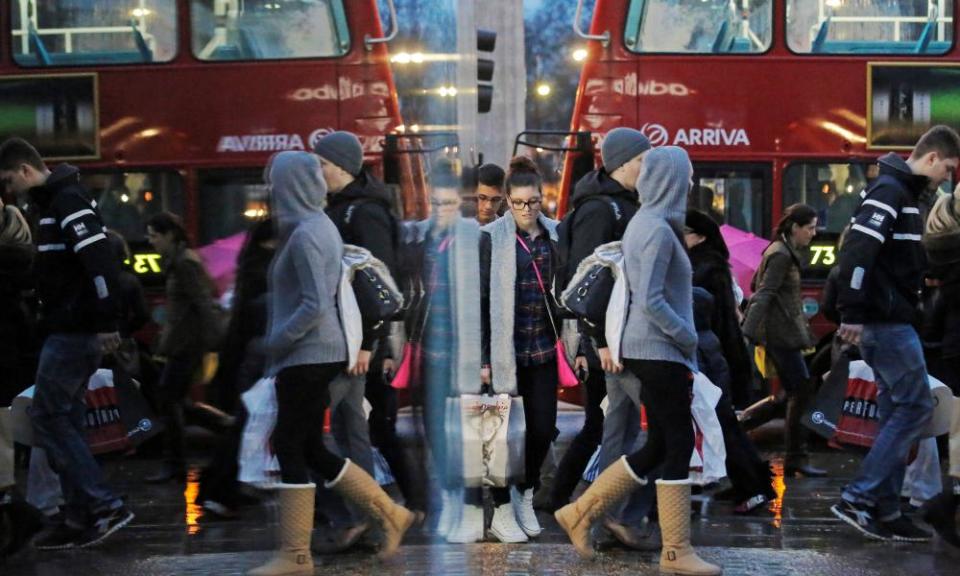Brexit economy: workers face squeeze but firms remain upbeat

The Brexit squeeze on household budgets has intensified over the past month, but companies and investors remain cautiously optimistic about the economic outlook in the run-up to the election, a Guardian analysis shows.
With a fortnight to go until the general election, the Guardian’s monthly tracker of economic news paints a mixed picture. Living standards are again falling, but while the economy has slowed markedly, as the latest GDP update showed, it continues to defy the gloomy forecasts of a Brexit recession made by some commentators this time last year.
In the latest figures, unemployment is at the lowest level since 1975 and retail sales rebounded as shoppers apparently shrugged off any worries about rising prices to keep spending in April, although many retailers and economists take issue with the accuracy of the official data.
Despite uncertainty over the impending Brexit negotiations with the rest of the EU, closely watched business surveys point to a buoyant mood across a broad range of companies and the FTSE 100 has set record highs.
But in a worrying pattern for an economy so reliant on consumer spending, other indicators show household incomes are being eroded as pay growth fails to keep pace with rising prices. Official figures show GDP growth slowed markedly in the opening quarter of 2017 to 0.2%, from 0.7% in the fourth quarter of 2016, as consumer spending was hurt by higher prices.
The blow to the pound from last summer’s referendum result is raising the cost of imports to the UK and inflation is at its highest level for three-and-a-half years. Pay growth has stalled, despite low unemployment and reports that companies are struggling to fill vacancies.
The news that Britain’s trade deficit widened more than expected in March has dampened hopes that stronger exports can make up for softer domestic demand. The latest GDP figures show net trade was a drag on overall economic growth in the first quarter.
In a further blow to consumer confidence, the housing market has shown signs of slowing. That will leave homeowners feeling less flush, but the prospect of prices falling to more affordable levels will be welcomed by those trying to get on to the property ladder.
To gauge the impact of the Brexit vote on a monthly basis, the Guardian has chosen eight economic indicators, along with the value of the pound and the performance of the FTSE 100.
The dashboard for May shows retail sales have rebounded, unemployment has dropped further and business activity continues to expand. But inflation is at its highest level for more than three years, wages are falling in real terms and Britain’s trade performance has deteriorated. House prices continue to edge up, but estate agents say the market is slowing. The deficit was wider than forecast in April as lower VAT receipts took their toll on the public finances.
Compared with economists’ forecasts, there was a better than expected performance in four of the eight categories. Two were worse than expected and one was as forecast. Inflation was higher than commentators had been expecting.
Writing in the Guardian, the former Bank of England policymaker David Blanchflower said the big economic story this month was “all about declining real wage growth”.
“Workers are being punished by Brexit,” said Blanchflower, a professor of economics at Dartmouth College in the US.
He noted that regular weekly pay once adjusted for price rises was £465 a week in March 2017. “This contrasts with £472 a week in March 2007, before the start of the ‘great recession’. So pay packets buy less than they did a decade ago,” he said.
While pressures on domestic consumers are rising, the more internationally focused FTSE 100 share index has set record highs in the past month. On currency exchanges, the pound has recovered some ground against a US dollar weakened by doubts around the political future of Donald Trump. But sterling has dipped against the euro. It is still down by more than 10% against the dollar and euro when compared with the day of the referendum last June.
“The pound’s sharp drop makes imports to the UK such as food ingredients and fuel more expensive,” said Blanchflower, highlighting the rise in inflation to 2.7%, well above the Bank of England’s 2% target.
With prices rising, it remains to be seen if retailers can continue to enjoy the strong sales growth they clocked up in April, when sunshine and Easter holidays drew in shoppers. Economists warn that it was most likely a one-off and that whichever party forms the next government after the 8 June general election will be faced with a tough economic outlook as the UK’s main engine of growth, consumer spending, comes under pressure.
Andrew Sentance, another former member of the Bank of England’s monetary policy committee, warned against reading too much into the latest retail sales data. He said the overall pattern from recent indicators was one of an economy losing steam.
“Taking all this data together, it is generally consistent with the slowdown in economic growth expected by most economic forecasters this year and next,” said Sentance, a senior economic adviser at PricewaterhouseCoopers.
“Despite this, optimism about global prospects plus a decline in the value of the pound against the euro has helped to push up the UK stock market, with the FTSE 100 hitting a new record high in the middle of last week.”
The Bank of England’s latest outlook was for household budgets to be hit by a cocktail of higher inflation and slower pay growth this year. But it predicted living standards could start to recover in 2018.
The Bank also forecast that the economy would continue to grow this year by 1.9%, more than double the 0.8% pace of growth it was predicting for 2017 in forecasts made last August following the Brexit vote.

 Yahoo Finance
Yahoo Finance 